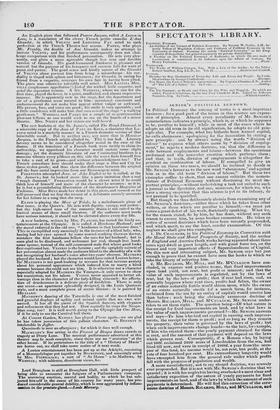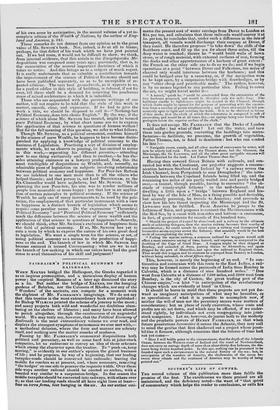SENIOR'S POLITICAL ECONOMY.
IN Political Economy the coining of terms is a most important business ; fora good part of the terms in this science are expres- sive of principles. Almost every peculiarity of Mr. SENIOR'S nomenclature indicates a principle, which is, or which he supposes to be, peculiar to himself ; while in most of the cases where he adopts an old term in its old signification, he adopts an old prin- ciple also. For example, what has hitherto been termed capital, lie calls abstinence ; apologizing for the innovation by stating a new principle : and by always using the words 6' division of labour" to express what others mean by " division of employ- ment," he rejects a modern doctrine, viz. that the difference is wide between employments and labour—between the operations performed and the muscular exertion which performs them ; and that, in truth, division of employments is altogether de- pendent on combination of labour. If compelled to give an opinion on these two cases, we should be inclined to decide in Mr. SENIOR'S favour as to the new word " abstinence." and against him as to the old term " division of labour." But these two examples suffice to show, that one cannot criticize the nomen- clature of Political Economy without discussing its most im- portant principles,—without undertaking a task not suited to such a journal as the Spectator, and one, moreover, for which we, who have a strong suspicion that this science is yet in its infancy, de not pretend to be qualified. But though we thus deliberately abstain from examining any of Mr. SENIOR'S doctrines,—either those which he takes from other writers, or those which are peculiar to himself,—we must yet notice a great defect of his work, doctrinally speaking. What we, for the reason stated, do by him, he has done, without any such reason to excuse him, by some brother economists. He takes no notice of several doctrines which have been recently propounded, and which merit, to say the least, careful examination. Of this neglect we shall give two examples. I. Dr. CHALMERS, in his Political Economy in Connexion with the Moral State and Moral Prospects of Society, and the author of England and America (both works having appeared about three years ago) dwell at great length, and with great force too, on the causes and very important effects of Superabundance of Capital. On this new and interesting subject, Mr. SENIOR says but just enough to prove that he cannot have seen the books to which we take the liberty of referring him. 2. Mr. RICARDO, Mr. Mitt, and Mr. M'CuLLocx have con- cluded, in express and positive terms, that fixed improvements upon land yield, not rent, but profit or interest; and that the value of such improvements is regulated, not by the laws of rent, but by the laws of profit; that if rent had risen, and, as generally happens where rent rises,, profits had fallen, the owner of an estate naturally fertile would obtain more, while the owner of an estate naturally sterile (of a marsh farm, for instance, reclaimed from the sea by an outlay of capital) would receive less than before : such being the obviously erroneous doctrine of Messrs. RICARDO, MILL, and M•Cui.LocH, Mr. SENIOR under- takes to set them right. The question being—Of what nature is the receipt for fixed improvements on land, and by what laws is the value of such improvements governed ?—Mr. SENIOR answers and says—To him who laid out capital in causing such improve- ments, the receipt for them is profit ; and so long as they remain his property, their value is governed by the laws of profit ; but when such improvements change hands—to the heir, for example, of him who created them—the yearly payment obtained for them is rent, and the amount of that payment will depend on the laws which govern rent. Consequently, if a Roman who, by laying out 500/. reclaimed 2000 acres of Lincolnshire from the sea, had lived till now, and were in receipt of 20001. a year from the occu- pier of this land, his income would be, not rent, but profit, at the rate of four hundred per cent. His extraordinary longevity would have exempted him from the general rule under which profits fall with the progress of population and wealth. A more unsatisfactory, not to say absurd doctrine, was scarcely ever propounded. But it is not with Mr. SENIOR'S doctrine that we quarrel ; it is with his neglect in having overlooked a most clear and satisfactory exposition of the nature of yearly payments for fixed improvements on land, and of the laws by which the amount of such payments is determined. He will find this correction of the erro- neous doctrine of Messrs. Ricsano, MILL, and M'CuLLocu, aud of his own error by anticipation, in the second volume of a yet in- complete edition of the Wealth of Nations, by the author of Eng- land and America, p.243. These remarks do not detract from our opinion as to the great value of Mr. SENIOR'S book. Nor, indeed, is he at all to blame, perhaps, for that defect of his work which we have just pointed out. Uwe had room, it would not be difficult to show, we think, from internal evidence, that this article in the Encyclopedia Me- tropolitana was composed some years ago; previously, that is, to the enunciation of the several important doctrines of which it takes no notice. And this brings us to a subject of much regret. It is really unfortunate that so valuable a contribution towards the improvement of the science of Political Economy should not have been published separately, so as to be susceptible of re- peated editions. The very best groundwerk, as it appears to us, for a perfect edifice in this style of building, is tabooed, if not for ever, till there shall be a demand for renewing the ponderous mass of mixed architecture in which it is imbedded.
Those who are acquainted with the previous writings of our author, will not require to be told that the style of this work is correct, smooth, clear, and expressive. If we had to give the work a title, we should be disposed to call it—" Nothing-but Political Economy, done into choice English." By the way, if the seience of which alone Mr. SENIOR has treated, might be termed pure Political Economy, by what short name are we to express the application of that science to questions of human welfare ? But for the full meaning of this question, we refer to what follows. Though Mr. SENIOR, as a political economist, confines himself to the science of mere Wealth, he happens to have become distin- guished for applying a knowledge of political economy to the business of Legislation. Practising a sort of division of employ- ments which, let us observe in passing, he has omitted to notice in this work,— separating his different pursuits,— attending now to one thing exclusively and then to another,—he has (be- sides attaining eminence as a lawyer) produced, first, this the most intelligible of disquisitions on Wealth, and, secondly, an admirable piece of legislation on subjects involving relationship between political economy and happiness. For Poor-law Reform we are indebted to one man more than to all the others who helped therein; and that person is, not Lord BROUGHAM, as the Ex-Chancellor would have us:ibelieve, but Mr. SENIOR. While planning the new Poor-law, his aim was to render millions of people less miserable or more happy : yet that law is an applica- tion of certain principles in political economy. If the science of Wealth be only one of many instruments to be used by the poli- tician, the employment,of that particular instrument with a view to happiness is a distinct branch of legislation which seems to requir3 some peculiar name. Do the expressions "Theoretical Political Economy " and" Practical Political Economy" sufficiently mark the difference between the science of mere wealth and the application of that science to questions of happiness ?—Scarcely, we should think, after Mr. SENIOR'S exclusion of happiness from the field of political economy. If so, Mr. SENIOR has yet to coin a term by which to express the nature of his own great deed in legislation. We want a single term for the science, or art, of using political economy as a means to the production of happi- ness as the end. The branch of law in which Mr. SENIOR has become eminent is termed Conveyancing : what are we to call the branch of law-making in which our rulers have had the good sense to avail themselves of his skill and judgment?



























 Previous page
Previous page